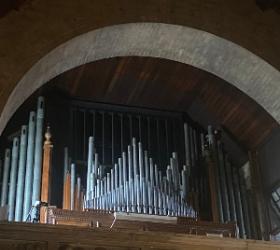
The second annual Ascension Organ Academy took place June 11–15, 2012, at the Church of the Ascension on Fifth Avenue and 10th Street in New York City. This week of masterclasses was instituted in June of 2011 to celebrate the inauguration earlier that year of the Manton Memorial Organ, a magnificent two-console organ built by Pascal Quoirin. (See The Diapason, November 2011.) This 95-stop, 111-rank instrument was designed to play as much of the repertory as possible, with its three-manual mechanical-action console and four-manual electric-action console. A particular source for the timbral world of the organ was Messiaen’s organ at the Église de Sainte-Trinité in Paris.
The eight students in the masterclass worked with two teachers: Dennis Keene, titular organist of the new instrument and the conductor for many years of the Voices of Ascension Chorus and Orchestra, and Jon Gillock, one of the foremost interpreters of the music of Messiaen and author of the recently published book Performing Messiaen’s Organ Music: 66 Masterclasses.
The masterclasses were organized in ideal fashion. Each of the eight students played every day in one of the two classes, in either Gillock’s afternoon class on the electric console or Keene’s evening class on the mechanical console. Gillock’s class focused on the 19th-century French repertory and the music of Messiaen, Keene’s class on Bach and the French Baroque. A schedule was generated each day for the following day’s class, and each student had almost an hour in the morning to prepare for that day’s class on either of the two consoles. Just knowing what and when you were going to play in advance and having practice time each day was a luxurious change from other masterclasses I’ve participated in.
The other advantage of such a modestly sized class was that we really got to know each other and each other’s playing. Part of the pleasure was getting to know the other students and sharing our experiences, something made possible by the all-day format with dinner breaks, and the small group made it possible to agree on restaurants and to find tables large enough to accommodate all of us. The participants in the class, who came from all over the U.S., were Chris Dekker, Brian Glikes, Benjamin Kolodziej, Chad Levitt, Ryan Murphy, Eva Sze, Will Thomas, and myself.
Another benefit of the small class and daily performances by each of us was that we could observe each other’s progress from class to class. I’ve found that the first encounter between student and teacher in a masterclass can be valuable, but it’s relatively easy for the teacher to be impressive and for the student to hear attractive new ideas without really changing; only in continuing to work together can you really assess the responsiveness of the student and the ability of the teacher to transform the playing. It would be impossible to describe the range of ideas that were presented in the classes throughout the week but in briefest summary.
Dennis Keene’s experience as a choral conductor was always evident in his attempts to get the performances to sing and breathe, and to more keenly reflect the dramatic shape of the music. The sound he produced on the mechanical action console was varied and beautiful, and almost piano-like in its range. Jon Gillock’s attention to the emotional and transcendent content of the music, his understanding of Messiaen’s compositional techniques and how to translate them into effective performance, and his ability to enter into the musical world of the student in an empathetic way were wonderful. Having the two classes on the different consoles was a great way to keep our ears fresh and to display the full capabilities of the Quoirin organ.
The repertory ranged from preludes and fugues, trio sonatas, and organ chorales by Bach to music by Couperin,
de Grigny, Mendelssohn, Franck, Vierne, and Messiaen. All of this music was realized, to my ears, in ways entirely appropriate to the various styles, with a range of timbre and texture that was fresh, beautiful, and exciting. And a not insignificant aspect of the week and the performances was the physical beauty of the organ and the church, with its 1888 LaFarge mural over the altar and its Tiffany stained glass windows.
The third Ascension Organ Academy is scheduled for June 10–14, 2013. In the meantime, the Manton Memorial Organ can be heard every Sunday and in concerts by distinguished guest artists. On January 23, John Scott performed, and on March 5 Jon Gillock continues his series of concerts of major works of Messiaen with the Livre du Saint Sacrement. Gillock is also in the process of recording Messiaen on the Quoirin organ, and these highly anticipated recordings will be available soon.




